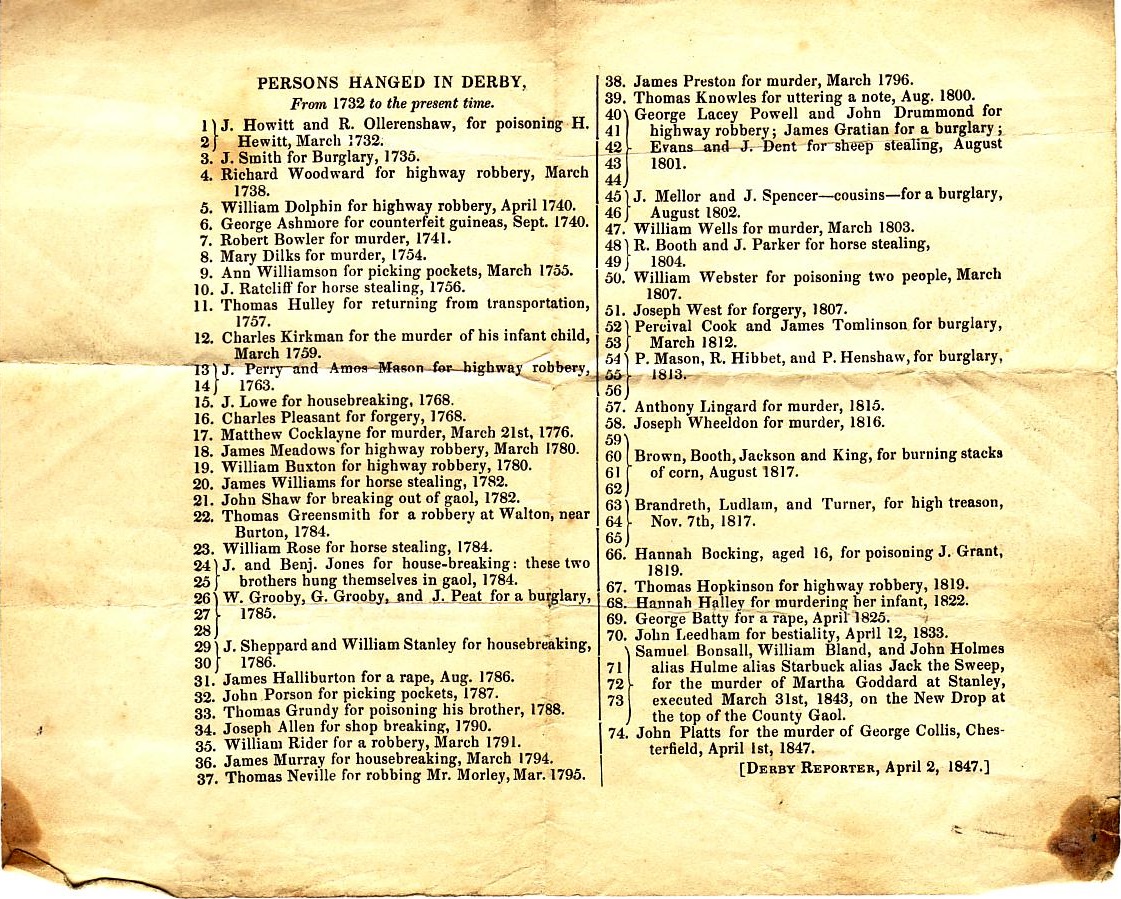Derby Gaol on:
[Wikipedia]
[Google]
[Amazon]
The term Derby Gaol historically refers to the five 
History of Derby County Gaol from theprison.org.uk
Derby Gaol website
{{Derby Museums in Derby Prisons in Derbyshire Prison museums in the United Kingdom Defunct prisons in England Debtors' prisons
gaol
A prison, also known as a jail, gaol, penitentiary, detention center, correction center, correctional facility, or remand center, is a facility where people are imprisoned under the authority of the state, usually as punishment for various cri ...
s in Derby
Derby ( ) is a City status in the United Kingdom, city and Unitary authorities of England, unitary authority area on the River Derwent, Derbyshire, River Derwent in Derbyshire, England. Derbyshire is named after Derby, which was its original co ...
, England. Today, the term usually refers to one of two small ‘tourist attraction
A tourist attraction is a place of interest that tourists visit, typically for its inherent or exhibited natural or cultural value, historical significance, natural or built beauty, offering leisure and amusement.
Types
Places of natural beaut ...
s', the gaol which stood on Friar Gate from 1756 to 1846 and the cells of which still exist and are open to the public. Their possible location, size and function have been assigned for the attraction, alongside a modern kitchen and bar. The 1843 to 1929 Vernon Street Prison whose frontage can still be seen today, has been redeveloped for modern commercial use.
History
In 1652 the Cornmarket Gaol (no longer extant) was the site of the imprisonment ofGeorge Fox
George Fox (July 1624 Old Style and New Style dates, O.S. – 13 January 1691 Old Style and New Style dates, O.S.) was an English Dissenters, English Dissenter, who was a founder of the Quakers, Religious Society of Friends, commonly known as t ...
on charges of blasphemy
Blasphemy refers to an insult that shows contempt, disrespect or lack of Reverence (emotion), reverence concerning a deity, an object considered sacred, or something considered Sanctity of life, inviolable. Some religions, especially Abrahamic o ...
. Fox became the founder of the Christian denomination the Religious Society of Friends
Quakers are people who belong to the Religious Society of Friends, a historically Protestant Christian set of denominations. Members refer to each other as Friends after in the Bible, and originally, others referred to them as Quakers ...
, perhaps better known as the Quakers. It has been alleged that Judge Bennett of Derby first used the term Quaker to describe the movement, as they bid him to 'quake for fear of the Lord', but the phrase had already been used in the context of other religious groups so the etymology is dubious.
Friar Gate Gaol
The Friar Gate Gaol was site of many hangings, and the small attraction today displays reproduction newspaper accounts of the executions on the walls, a replica of a gallows which stood in front of the building can be located in the small garden of the gaol. The police museum has subsequently closed.The New County Gaol (Vernon Street Prison)
The Vernon Street Prison served as the County Gaol from 1843 to 1919. The last public execution at Derby of Richard Thorley for the murder of Eliza Morrow took place here in 1862. The last person to be hanged was William Slack on 16 July 1907 for the murder of Lucy Wilson. From 1919 to 1929 the prison acted as amilitary prison
A military prison is a prison operated by a military. Military prisons are used variously to house prisoners of war, unlawful combatants, those whose freedom is deemed a national security risk by the military or national authorities, and members o ...
. It was then decommissioned. Following demolition, the site served as a Derby Greyhound Stadium, and today contains offices, though the historical facade still remains.
Notable prisoners
* Jeremiah Brandreth – High Treason * Humphrey Berisford – RecusantReferences
External links
History of Derby County Gaol from theprison.org.uk
Derby Gaol website
{{Derby Museums in Derby Prisons in Derbyshire Prison museums in the United Kingdom Defunct prisons in England Debtors' prisons